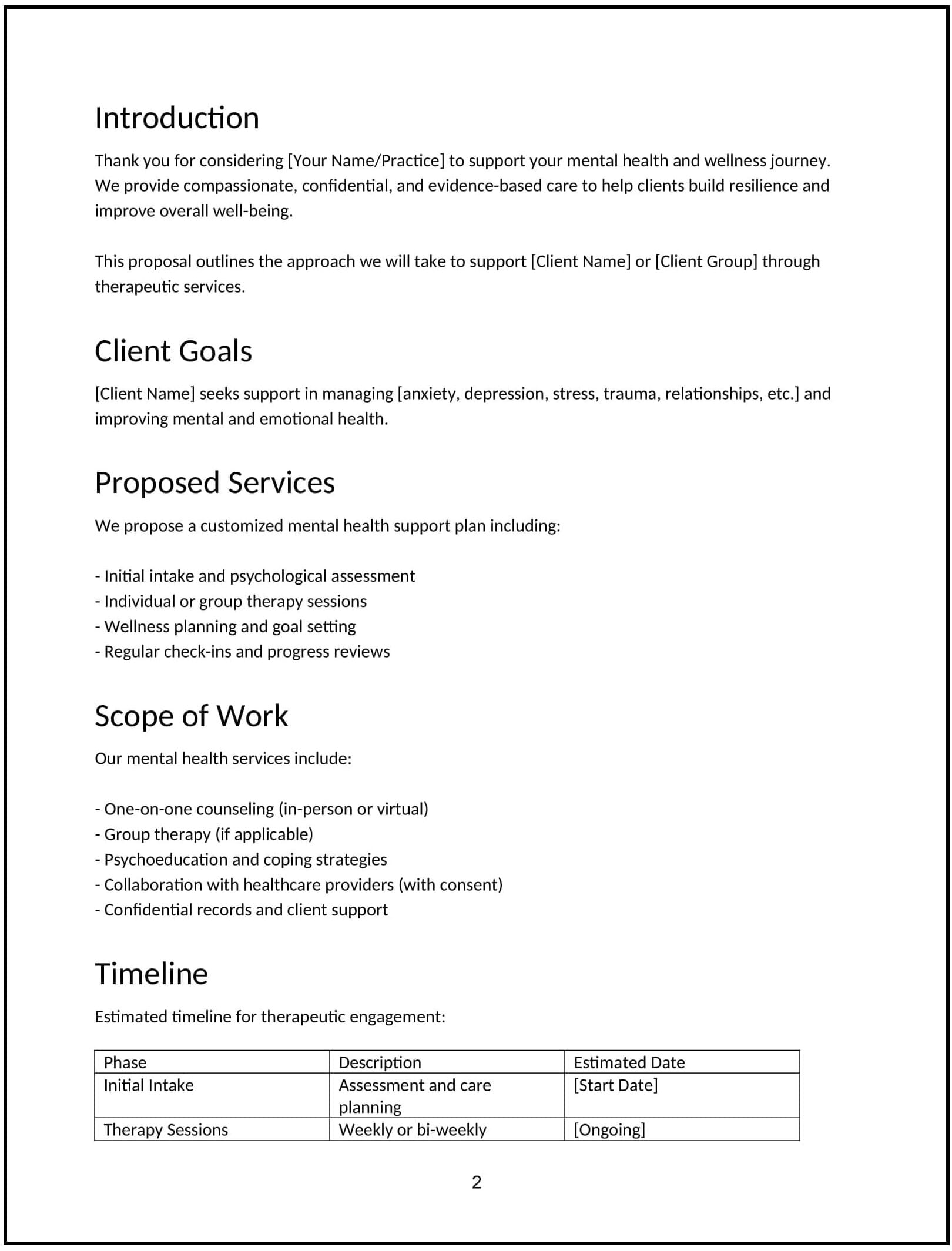Got contracts to review? While you're here for proposals, let Cobrief make contract review effortless—start your free review now.

Customize this template for free
Customize this free mental health services proposal with Cobrief
Open this free mental health services proposal in Cobrief and start editing it instantly using AI. You can adjust the tone, structure, and content based on the services offered, the client population, and your approach. You can also use AI to review your draft — spot gaps, tighten language, and improve clarity before sending.
Once you're done, send, download, or save the proposal in one click — no formatting or setup required.
This template is fully customizable and built for real-world use — ideal for private therapy practices, corporate wellness partnerships, school counseling programs, or community support initiatives. Whether you're proposing individual therapy or group programs, this version gives you a structured head start and removes the guesswork.
What is a mental health services proposal?
A mental health services proposal outlines the structure, scope, and pricing for professional support services such as therapy, counseling, workshops, or mental wellness programming. It’s typically shared after an initial consultation or inquiry, and helps set clear expectations on what services will be provided, how they’ll be delivered, and how outcomes will be supported.
This kind of proposal builds clarity and trust — especially in sensitive or high-stakes contexts.
A mental health services proposal helps:
- Communicate a clear and compassionate approach to support
- Define the structure and format of care or programs
- Offer transparent pricing and scheduling information
- Build confidence through professionalism and planning
If you're offering mental health services and want to turn interest into a structured engagement, this format is designed to help.
Why use Cobrief to edit your proposal
Instead of formatting documents manually or sending long emails, use Cobrief to create a polished, supportive, and structured proposal — with AI support at every step.
- Edit the proposal directly in your browser: No formatting stress — just open and personalize
- Rewrite sections with AI: Refine tone, clarify structure, or adjust content to match the audience
- Run a one-click AI review: Catch missing details or overly complex language
- Apply AI suggestions instantly: Accept edits one-by-one or apply all at once
- Share or export instantly: Send a live link or download a clean PDF or DOCX file with your branding
Cobrief helps you communicate with clarity, empathy, and structure — all in one place.
When to use this proposal
This mental health services proposal is ideal for:
- Offering therapy or counseling services to individuals or organizations
- Responding to RFPs for wellness programs, EAPs, or mental health support in schools or companies
- Proposing structured care packages for private clients
- Pitching group programs, support circles, or psychoeducational workshops
- Formalizing pricing and scope after an initial discovery call or intake session
Use this proposal whenever you want to clearly present your services and support model.
What to include in a mental health services proposal
Each section helps the client or organization understand what support you’re offering and how it will work. Here's how to use them:
- Executive summary: Briefly explain the purpose and approach of your services (e.g., “Provide individual and group counseling to support anxiety management and emotional resilience for employees navigating return-to-office transitions.”)
- Scope of services: List what’s included — individual therapy, group sessions, assessments, workshops, crisis support, wellness programming. Be clear about formats and session limits.
- Approach and philosophy: Share your therapeutic orientation or framework (e.g., CBT, trauma-informed care, solution-focused), and how you adapt it to meet client needs.
- Structure and delivery: Explain session length, frequency, and format (e.g., virtual, in-person, hybrid). Clarify whether services are one-on-one, in groups, or organization-wide.
- About you / your team: Briefly introduce your qualifications, licensing, and experience. If relevant, include team bios or specialties.
- Pricing: Clearly outline session fees, program rates, or package costs. Mention sliding scales or billing cycles if applicable.
- Terms and conditions: Include policies around cancellation, confidentiality, communication boundaries, and session limits. Use plain, supportive language.
- Next steps: End with one clear action — e.g., “Reply to confirm and begin onboarding,” or “Click to schedule the first session.”
How to write an effective mental health services proposal
Clarity, compassion, and professionalism matter. Use these tips to strengthen your proposal:
- Center safety and support: Let the client know they’ll be guided with care and structure
- Use plain-smart language: Avoid clinical jargon unless you know your audience wants it
- Be transparent about scope: Set boundaries up front — what’s included, how long it lasts, and what happens after
- Keep tone calm and professional: Balance empathy with structure — clients should feel heard and reassured
- Close with confidence: Give them one clear step forward, without pressure